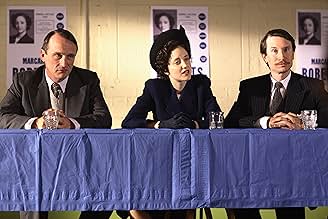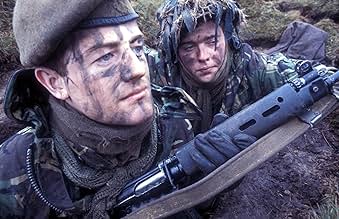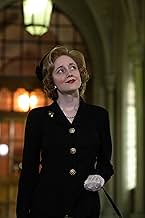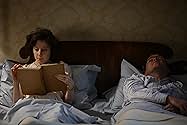Ajouter une intrigue dans votre langueOn April 2, 1982, Britain went to war to regain the Falkland Islands. This movie is a gripping account of how Prime Minister Rt Hon Margaret Thatcher MP's government handled the biggest cris... Tout lireOn April 2, 1982, Britain went to war to regain the Falkland Islands. This movie is a gripping account of how Prime Minister Rt Hon Margaret Thatcher MP's government handled the biggest crisis in British foreign affairs since the Suez Canal. It tells the story of how Argentina, a... Tout lireOn April 2, 1982, Britain went to war to regain the Falkland Islands. This movie is a gripping account of how Prime Minister Rt Hon Margaret Thatcher MP's government handled the biggest crisis in British foreign affairs since the Suez Canal. It tells the story of how Argentina, an ally of the British, fought the Conservative government and invaded the Falklands. This ... Tout lire
Avis à la une
The acting is of the highest order...... you truly believe that these are the people, and this is how they behaved (Hodges Thatcher is remarkable). Add this to a plot that fiction could never match, and you are likely to be hooked from the opening scene.
With caution, I would also suggest that this drama does bring history to the viewer, in a way the BBC seems to constantly excel at. Much of the script is taken from hansard (parliamentary transcripts), contemporary diaries, and news reports..... the drama didn't need to be invented.
One or two earlier reviewers felt that it was a historical distortion, however, in my opinion, they are still grinding axes.
So yes.... do bear in mind that in the years running up to the crisis, perhaps the Brits took their eye off the Falklands (though this is outside the remit of this play).
Also yes.... there was the major incident 'sinking of the Belgrano', that in real life, was controversial. However, I believe the play portrayed the genuine view of the decision makers: 'destroy it, before it destroys us'.... a view held by the majority of the UK population (I would suggest).
As for the suggestion that 'Thatcher would never have ranted against Argentina to the US', I find beyond belief. That's exactly how she behaved, and she was famous for it AND by the way, it is portrayed marvelously in this play, with the joy of historical posturing so well done.
If you get the chance...... watch it!
The film certainly has a fine cast. Patricia Hodge excels as Thatcher or at the very least playing the Thatcher portrayed in the script. Hodge's Thatcher is a strong willed woman who refuses to back down under any circumstances. The supporting cast includes strong performances from James Fox as Foreign Secretary Lord Peter Carrington, Clive Merrison as Defence Minister John Nott, Colin Stinton as US Secretary of State Alexander Haig, John Woodvine as Admiral Sir Terence Lewin and Tom Chadbon as Admiral Sir John Fieldhouse. Each of their performances, and those of much of the rest of the cast, gives the film a strength that it needs.
The production values of The Falklands Play are strong as well. Melanie Allen's production design captures the real life settings of the film including an excellently done set of the House of Commons. The film's cinematography is exceptional as well with its cinema verite approach. The result is that the film is given a strong documentary feel to the entire film, giving the viewer the sense of watching history unfolding before them. The film also makes strong use of documentary footage from the time as well, mixing it skillfully into the drama. Like the performances, these elements give the film a strength that it needs.
The script by Ian Curteis is at the heart of the film. The script after all was the single most controversial aspect of the production for almost twenty years. Back in the 1980s, the BBC deemed the script to be too pro-Thatcher and jingoistic in its tone. Looking at the film itself, it is very easy to see how that came about. The strong willed portrayal of Thatcher and her handling of her the situation is certainly pro-Thatcher. Also the film's portrayal of the decisions leading to the sinking of the Argentinian warship the General Belgrano, one of the most controversial events of the war, can certainly be seen to be pro-Thatcher. Surprisingly, the script used in the film isn't even the one originally written in the 1980s as it removes all the scenes involving the Argentinian Junta and the Pope. One suspects that the reaction the film would have gotten in the 1980s when it was supposed to have aired would have been similar to the reception that the 2003 Showtime film DC 9/11: Time Of Crisis (a film about President George W. Bush's handling of the 9/11 attacks and the lead up to the invasion of Afghanistan) received when it aired: being seen overwhelmingly as a piece of propaganda. The Falklands Play definitely isn't that but it is all too easy to see how it could have been seen as such.
The Falklands Play is an interesting film. It has strong performances from its entire cast and also features strong productions values especially with its cinematography. The script however is the film's most interesting point as it was the source of controversy that kept the film from originally being made to begin with. With hindsight, it is easy to see why the script proved so controversial at the time and why it could remain so today. The Falklands Play therefore is an interesting film about a controversial war and a intriguing piece of historical drama.
Britain won the little but costly war and Prime Minister Margaret Thatcher emerged he winner. She was a hard charger and much admired for it. Of course if the victory had been the other way round, a lot of people would be dead for little reason and she would be thrashed. As it was, there was no stopping her in her determination. One American consultant muses, "I wish there were more like her. You always know exactly where you stand." "In the corner," replies another.
There is very little footage of the war itself. The script seems to jump from the landings of the British SAS to the surrender of the Argentinian soldiers. But that's okay because this is, after all, a play, not a big budget feature film. Besides, the general outline of the war's progress is already familiar to some viewers, although by no means all of them. Anyone interested in the engagements should be directed to the concise documentary, "20th-Century battlefields: 1982 The Falkland Islands War." It can be viewed free on YouTube.
The script has sufficient continuity so that we can follow events as they unfold, even though we're confined mostly to a few rooms and a handful of other sets. As Thatcher, Patricia Hodge is quite good, if lacking in heft. And there isn't a dull bulb among the supporting actors. There are a few moments of humor. Someone tells the Defence Minister, Clive Merrison, that this is the first time a British fleet has set sail for an attack since Suez. Merrison replies slowly and deliberately. "Can we keep Suez out of this conversation? Those are two little words that -- irk." The well-meaning Americans provide some ludic relief as well. Thatcher invites the American consultants to dinner and takes aside Alexander Haig, the Defense Secretary before they sit down. Thatcher shows him a large painting of two men -- the Duke of Wellington and Lord Nelson, saying that they were two heroes who put an end to willful aggression by dictators. "I thought you might want to look at them during dinner." Haig mutters into his drink, "Gee, thanks."
The role of the Americans is that of a nation full of good will, anxious to avoid bloodshed, and apparently oblivious to the fact that Argentina is under the thumb of a brutal military junta who has invaded the Falklands -- which they (still) insist on calling Las Malvinas -- in order to distract the population from the catastrophic conditions at home. Haig is a good guy, although ineffective. President Reagan's attitude was that "both of them are our friends," even after the British ambassador reminds him that Britain didn't hesitate for a moment to aid in the extraction of 52 hostages after the embassy takeover in Iran.
Reagan apparently listened less to Haig than to his UN ambassador, Jeanne Kirkpatrick. Kirkpatrick was a pragmatic and ardent anti-communist. As Wikipedia puts it, "She was known for the "Kirkpatrick Doctrine", which advocated supporting authoritarian regimes around the world if they went along with Washington's aims. She believed that they could be led into democracy by example." Argentina fell into that category.
Reagan himself thought it a minor matter, calling them "bleak little islands" and never quite remembering their name. After the British victory, Reagan called on Thatcher to be "magnanimous," and Thatcher blew him off. By the time the war had begun, however, the US came around and placed an embargo on shipments to Argentina and agreed to supply Britain with whatever materiél it required.
Whatever else this fine program does, it illustrates the way that democracy is supposed to work, and of course it will be informative to those whose memories don't extend very far into history.
Originally written by Ian Curteis shortly after the war ended but the BBC declined to produce it, officially because it wasn't good enough, but widely believed to be because it was too pro-Conservative just before a General Election in the UK. Watching it now it's even harder to believe that it wasn't good enough to make years ago.
Telling the story of the British politics immediately before and during the conflict Patricia Hodge is brilliant in her role as Mrs. Thatcher. So scarily like her that during the recreated news clips it's hard to remember which one is the actress. Although some of the other lead characters look and sound nothing like their alter-egos, they still manage to recreate the right atmosphere.
Deliberately supposed to show the conflict from `our side' I'm not sure if the emotional side of Margaret Thatcher isn't over played slightly.
Le saviez-vous
- AnecdotesOriginally commissioned by the BBC in 1987, but wasn't filmed until 2002.
- GaffesAdmiral Lewin is wearing the South Atlantic Medal. Before the war had even begun.
- Citations
[in a War Cabinet meeting]
Margaret Thatcher: Do we send those ships? Do we still have the will to fight aggression by force of arms, even halfway across the world, even at huge risk of world opinion turning against us? Because if we don't have it any more, for God's sake say so now and pull out before we start. It may be we *are* going to war. People *will* get killed. Innocent people. Young soldiers, many of whom won't even know what it is we are fighting for. Are we really prepared to do that? Do we still believe what we certainly believed in in 1940? Or is that now just the romance of history, nothing to do with the cold reality of Britain in 1982, part of a nation that has, actually, quietly died, as Greece died, as Spain died? Because if in our hearts we really believe that Britain is dead, then it would be a crime of the direst and blackest sort to send those men to fight, a crime of which the country would very soon find us guilty, because their hearts won't be in it. The first death will light the fuse that will blow us sky-high and clean out of office at the next election. Now, do we send the signal or not?
[each cabinet minister, with some hesitation, says "yes"]
- Crédits fousThe first names of Nicholas Ridley and Jeanne Kirkpatrick were mis-spelled as Nicolas and Jeane in the closing credits.
- ConnexionsFeatured in When TV Goes to War (2011)


































